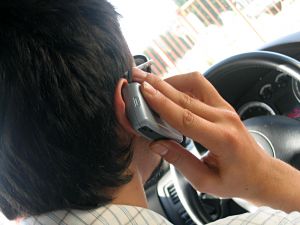Professor Simon Washington from QUT's Centre for Accident Research and Road Safety (CARRS-Q) said a new law in New South Wales requiring drivers to use Bluetooth or put their phone in a cradle was unlikely to deter drivers.
"This means a New South Wales driver using a mobile phone in speaker mode on their lap, or nestled in the crook of their neck, is still breaking the law, even if they still have both hands on the wheel," Professor Washington said.
"Most studies have shown that driving using hands-free devices is as dangerous as using handheld devices, so it is doubtful that this new law will improve the safety of drivers still making calls.
"One of the biggest distractions involved with using a mobile phone whilst driving is engaging in conversation with the person at the other end of the line - and this distraction persists regardless of whether or not the phone is in the driver's hand."
Professor Washington said Queensland laws were similar to those in New South Wales.
"In Queensland, the law states: The driver of a vehicle (except an emergency vehicle or police vehicle) must not use a mobile phone that the driver is holding in his or her hand while the vehicle is moving, or is stationary but not parked," he said.
But he said drivers around the world - including Australia - have largely ignored laws banning or restricting mobile phone use, even though phone use is estimated to be involved in 22 per cent of car crashes and 71 per cent of truck crashes.
"Studies worldwide have shown a fairly consistent and widespread lack of attention paid by motorists to laws banning mobile phone use whilst driving," Professor Washington said.
"In the future we need to get smarter about how we deal with these issues.
"Worldwide the approach to dealing with 'risky behaviour' on our roads has been predominately through punitive measures, such as fines, license restriction and revocation, and - in the worst and relatively rare cases - jail time. There may be other solutions on the horizon that are more effective in dealing with distraction.
"We need to intelligently harness the same technologies that are distracting us to our benefit, along with re-thinking how driving is priced, to offer incentives for people to drive more safely. We are seeing new vehicles now with warning devices and sensors that alert us when we are fatigued, driving too closely behind another car, and failing to brake quickly enough.
"Vehicle telematics, as they are known, can also be used to help make driving cheaper for safer drivers."
Professor Washington is with QUT's Faculty of Health and Science and Engineering Faculty. He is also the Queensland Transport and Main Roads Chair of Transport - a position that integrates Professor Washington's activities with the Queensland professional transport community.








